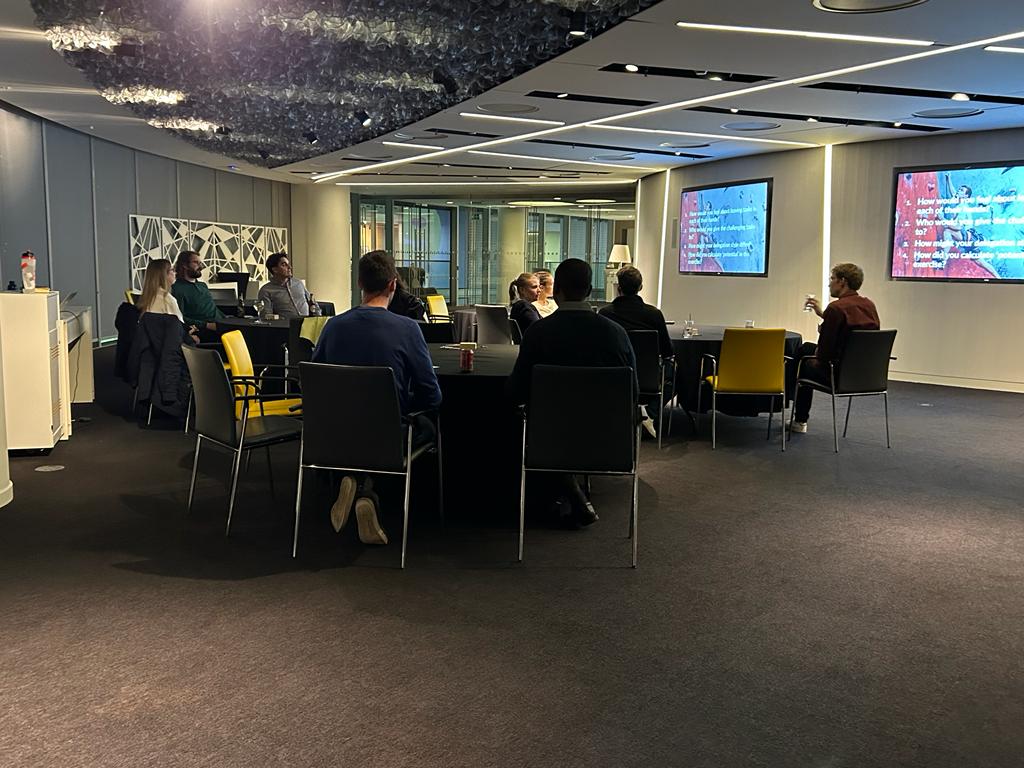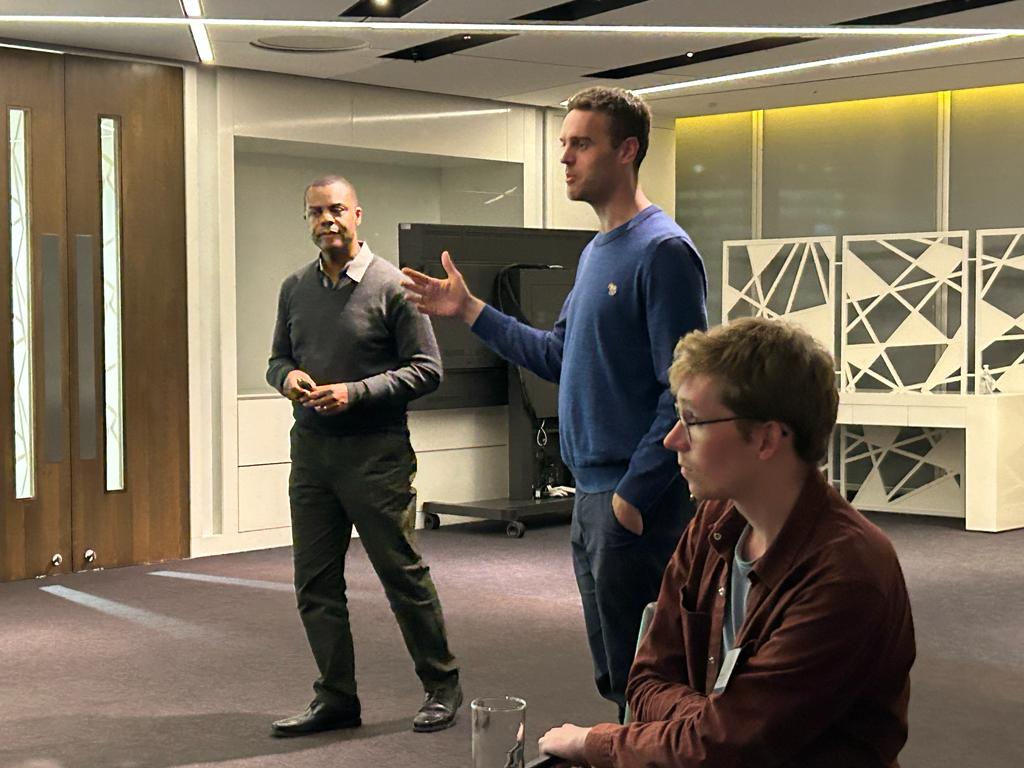February last year saw the launch of Behind Every Kick Clubhouse. The initiative aimed to create an opportunity for aspiring young professionals — working for our corporate and business donors — to access the cutting-edge expertise of EYLane4 in human performance and leadership. With Clubhouse 2022 now wrapped, we chatted with two of its inaugural delegates about their experience of the programme. Georgina Denslow is the finance officer at Cedar Recruitment, and John Harrington is a senior associate at Simons Muirhead Burton LLP.

How did you come to be involved in Behind Every Kick Clubhouse?
Georgina Denslow (GD): Our CEO had a connection to the charity, and so I found out about the programme through him. He shared the brochure with newer leaders in the business like me. I’d been managing a growing team for about a year. I was interested from a personal development point of view. But I also read up a bit about the work Behind Every Kick does to support young people, and that’s a passion I share.
John Harrington (JH): One of the partners at our practice pitched it as a chance for “rising stars” in the organisation to develop their soft skills and management in an environment facilitated by EYLane4. I’ve known about EY for a while and its leading reputation in human performance. But learning about the ‘Lane4’ element to their work and its origins in elite sport was an extra motivation for me to join Clubhouse. I also liked that we’d be helping the charity via a company donation to Behind Every Kick. And [John smiles] I suppose it’s nice to know my work think I’m a bit of a rising star!
What were the Clubhouse sessions like?
GD: There were four in-person sessions with the EYLane4 trainers. Each of these was followed up with a virtual session which reinforced our learning and allowed us to discuss how implementing the skills and techniques we’d developed was going. I really loved that all the sessions were interactive and dynamic. Both the trainers and other delegates brought real-life examples into our discussions. I’ve been on training programmes where you’re sat in a room with a PowerPoint presentation and get talked at for 90m minutes. This was nothing like that.
JH: I was so impressed with the quality of the trainers. There was a definite ‘wow factor’ hearing about the top professional athletes and sports teams they’ve worked with. I appreciated being able to put the theory into practice during the sessions. We’d often break up into small groups or pairs and discuss actual real-life scenarios and challenges. Everything we learned can be applied to your personal life as well as your professional one.
Did any sessions or techniques shared by the trainers particularly stand out to you?
GD: The session on communication and trust was so, so valuable. We explored how levels of trust in any relationship are determined by what you are willing to share. Only when you’re open to being vulnerable and able to share meaningful experiences in a conversation can you expect to receive that back from someone else. We were given this weird and wonderful formula that shows the elements that go into the building and breaking of trust. I’ve since used it with my team, and it absolutely works. We also did an exercise that involved constructing an achievement wall. It’s not something I’d come across before. But it’s a really effective way of bringing a team together and has boosted my confidence as a manager.
JH: I have to do a lot of networking in my role. Often there are fluffy conversations that don’t go beyond “how was your commute?” ****The session on building trust through communication was an eye-opener. You don’t have to go around in circles and can get stuck into more meaningful conversations even with people you are meeting for the first time. I also really enjoyed the teamwork session. Actually, maybe that’s the wrong word! The Clubhouse trainers put us into small teams and gave us a challenge we had to complete. They set it up by saying 80% succeed at the task. The psychology of that was fascinating. Firstly because it revealed that the challenge we’d been given wasn’t impossible. And secondly, there was motivation not to be in the 20% who couldn’t do it! As it happened, we didn’t manage to crack it. It was frustrating but in a good way. It reinforced lots of the insights I’ve gleaned from playing team sports. To achieve a common goal on the pitch – or in the workplace – it’s vital to appreciate other people’s strengths and understand their motivations.
Did you like that the themes of Clubhouse were explored through the prism of sport?
GD: Yes, I absolutely loved that aspect of the programme. If anything, I’d have welcomed even more sporting insights and examples. I grew up in a sports-mad family. I’d watch literally any sport that was on with my dad. One of my favourite examples of how the Clubhouse content was brought to life through sport was about the mindsets we adopt and pushing beyond limits. The trainers shared the story of Roger Bannister, the first man to break the four-minute mile in 1954. At the time, scientists said it was physically impossible for humans to run a mile in less than four minutes. But he developed his own training techniques and believed it could be done and then did it. It’s even more interesting that since Bannister proved it possible, over a thousand people have followed in his footsteps by running ‘miracle miles’ too. I’m a bit of a runner myself these days. It’s a love-hate thing for me. It’s tough getting out there in the cold. But once I have forced myself outside and have done the run, it’s such a good feeling!
JH I’m probably biased because I love sport. I’ve always played team sports and watched cricket, rugby union, rugby league, football and Gaelic football – anything involving a ball and competition! There are so many transferable skills you can draw from sport. But I think one thing that stood out for me in Clubhouse is the importance of a winning and open mindset. In sport, you watch people constantly pushing the barriers, breaking records or seemingly defying physics. They don’t achieve those things in isolation. They trust other people’s skills and knowledge to help them perform under incredible pressure.
However, you don’t have to be a sports fan to benefit from Clubhouse. The sporting examples were great and really appealed to me. But the trainers shared examples from their own lives and the corporate environments they’ve worked in, which were just as insightful and engaging. I’ll encourage other people I work with to join the programme next time it runs. I’ve taken learnings from every topic and enjoyed each session. I’d tell anyone interested in signing up to make the most of it and be willing to spare the time to attend and fully engage with the programme. You’ll get more out if you put more in.
The last question goes to Georgina. You’ve arranged for Cedar Recruitment to offer CV workshops to the young people attending Behind Every Kick development this season. Could you tell us more about why you wanted to do that?
GD: The idea of levelling the playing field is very close to my heart. My mum was the first person in our family to go to university. She did that later in life, studying while working full-time and raising two kids. That was a bit of a domino effect. I went to uni, my brother went to uni, and our cousins went too. I’m from Gateshead, and when I graduated, around 90% of all graduate jobs were in London. That’s why I moved down here. I want to help young people achieve their goals, so I think the work Behind Every Kick is doing is brilliant, and I’m keen to help in any way I can. Having attended Clubhouse, it’s great to know the young people you work with are getting access to the same knowledge and networks the programme provided me. In the future, if the charity grows into the Northeast, I’ll be your number-one ambassador there!

